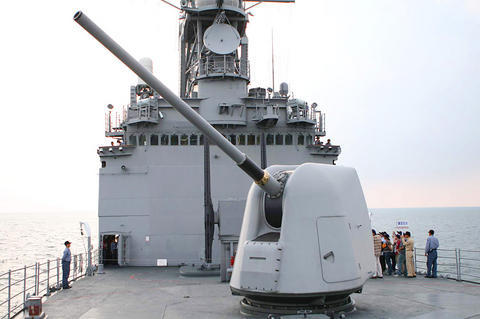A Kidd-class destroyer opened its doors to the media on Wednesday, offering visitors a display of its might during a live-fire exercise at sea.
The flagship Tsoying was accompanied by the Perry-class frigate Tzuyi and the Knox-class frigate Fengyang during the exercise in Tsoying, Kaohsiung.
Replenishment-at-sea and anti-submarine exercises were also held that day.

PHOTO: JIMMY CHUANG, TAIPEI TIMES
"What you are witnessing are drills that we hold on a routine basis," said Vice Admiral Chiang Lung-an (姜龍安), deputy commander of the Fleet Command Headquarters.
Lieutenant Chuang Fu-ke (
Chuang is the first woman to hold that position in the Navy's history.
"I am here to demonstrate that women can do these things just as well as men," she told reporters as they boarded the Tsoying.
Last Wednesday's demonstration was the latest in a recent series of drills made accessible to the media.
"Our policy is to keep the media and the population informed about what the military has been doing," Ministry of National Defense spokesman Major General Yu Sy-tue (虞思祖) said.
During a demonstration on Aug. 27, a Seahawk S-70C helicopter landed on the Lafayette-class Kuenming frigate, which was berthed at the Tsoying base.
Officers said the drill could be extremely dangerous as unpredictable and oftentimes strong winds during the landing phase could cause the helicopter to crash into the sea.
Sailors also held exercises, putting out simulated fires and fixing a mock leaking problem on the ship.
"Unlike a fire or leak on land, problems like this must be fixed immediately or it could very well jeopardize the entire ship and put its personnel at risk," Petty Officer Chen Yu-chuan (
Later that night at the Air Force's Hsinchu base, where the nation's Mirage-2000s aircraft are based, six jets carried out a nighttime scramble take-off, again in the presence of the media.
On Aug. 28 in Miaoli, soldiers staged an exercise demonstrating how they could regain control of a town occupied by enemy troops.
Army 269th Brigade Chief Major General Ma Chien-chun (

Japanese footwear brand Onitsuka Tiger today issued a public apology and said it has suspended an employee amid allegations that the staff member discriminated against a Vietnamese customer at its Taipei 101 store. Posting on the social media platform Threads yesterday, a user said that an employee at the store said that “those shoes are very expensive” when her friend, who is a migrant worker from Vietnam, asked for assistance. The employee then ignored her until she asked again, to which she replied: "We don't have a size 37." The post had amassed nearly 26,000 likes and 916 comments as of this

Taiwanese can file complaints with the Tourism Administration to report travel agencies if their activities caused termination of a person’s citizenship, Mainland Affairs Council Minister Chiu Chui-cheng (邱垂正) said yesterday, after a podcaster highlighted a case in which a person’s citizenship was canceled for receiving a single-use Chinese passport to enter Russia. The council is aware of incidents in which people who signed up through Chinese travel agencies for tours of Russia were told they could obtain Russian visas and fast-track border clearance, Chiu told reporters on the sidelines of an event in Taipei. However, the travel agencies actually applied

US President Donald Trump said "it’s up to" Chinese President Xi Jinping (習近平) what China does on Taiwan, but that he would be "very unhappy" with a change in the "status quo," the New York Times said in an interview published yesterday. Xi "considers it to be a part of China, and that’s up to him what he’s going to be doing," Trump told the newspaper on Wednesday. "But I’ve expressed to him that I would be very unhappy if he did that, and I don’t think he’ll do that," he added. "I hope he doesn’t do that." Trump made the comments in

Tourism in Kenting fell to a historic low for the second consecutive year last year, impacting hotels and other local businesses that rely on a steady stream of domestic tourists, the latest data showed. A total of 2.139 million tourists visited Kenting last year, down slightly from 2.14 million in 2024, the data showed. The number of tourists who visited the national park on the Hengchun Peninsula peaked in 2015 at 8.37 million people. That number has been below 2.2 million for two years, although there was a spike in October last year due to multiple long weekends. The occupancy rate for hotels